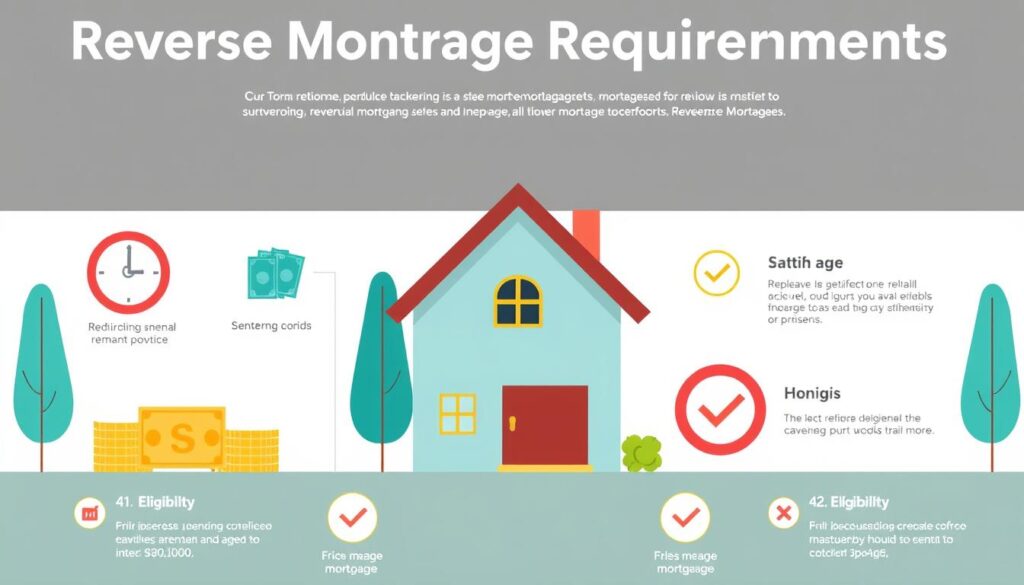As we age, the pursuit of financial freedom in retirement becomes not just a goal, but a necessity for maintaining an independent and comfortable lifestyle. One feasible solution that we at Heritage Reverse Mortgage advocate strongly for is a reverse mortgage for retirees. This specialized senior housing loan enables homeowners aged 62 or older to unlock the equity built up in their homes, thereby providing them with a flexible financial tool to enhance their golden years.
With the presence of Heritage Reverse Mortgage in key states like Utah, California, and Florida, it’s evident that the reach and positive impact of reverse mortgages are considerable. The sense of relief and affirmation from our clients underpin reverse mortgages as a strategic asset that supports a fluid and worry-free retirement.
Key Takeaways
- Understanding the benefits of a reverse mortgage for retirees is crucial for a secure financial future.
- Seeking a senior housing loan can alleviate monetary constraints and provide financial freedom in retirement.
- Homeowners 62 or older can convert part of their home equity into cash with flexible repayment options.
- Heritage Reverse Mortgage upholds consumer privacy and offers a range of reverse mortgage products.
- With a deep understanding of reverse mortgage intricacies, we equip retirees with the knowledge to make informed decisions.
- Reverse mortgages are federally insured and require HUD-approved counseling to ensure transparency and security.
- Jumbo reverse mortgages cater to those with high-value properties seeking larger loan amounts.
The Basics of Reverse Mortgage for Senior Homeowners
Reverse mortgage for seniors offers a financial lifeline by tapping into homeowner equity conversion. Essentially, these retirement loans convert part of the equity in a home into cash, which the homeowner can receive in various forms such as monthly payments, a lump sum, or a line of credit. These funds are particularly useful for covering living expenses, medical costs, or even home improvements, enhancing seniors’ quality of life without the need to sell their home.
Under the Home Equity Conversion Mortgage (HECM) program, which the Federal Housing Administration (FHA) administers, there have been over a million policies initiated by the end of 2018. These include both active and terminated loans, with a notable increase in defaults primarily due to non-compliance with residential or financial requirements such as property tax and insurance payments. To combat these issues, about 22% of behind-schedule borrowers were placed on repayment plans to prevent foreclosure, showcasing the program’s adaptability and support for senior homeowners.
Adjacently, certain fiscal stipulations aligned with the HECM program include upfront mortgage insurance premiums fixed at 2% of the home’s appraised value, with subsequent annual premiums aggregating to 0.5% of the outstanding loan balance,ensuring the loan’s feasibility for both lenders and borrowers. Importantly, reverse mortgages require no monthly payments back to the lender as long as the senior remains in the home and complies with all loan terms.
- Borrowing limits are influenced by factors such as homeowner age, home equity, and prevailing interest rates.
- Origination fees for these loans vary but can include a percentage of the home’s value, ensuring that the costs are proportional and regulated.
- The majority of reverse mortgages are dispensed as lump sums, monthly installments, or credit lines, providing flexibility in how seniors manage their finances.
To ensure informed decision-making, HUD mandates that all potential borrowers receive counseling to understand the benefits and obligations of reverse mortgages fully. This session typically lasts around 90 minutes and costs about $125, an investment towards securing financial stability during retirement.
Reflecting on the broader scope, reverse mortgages stand as a viable option for seniors seeking to leverage their home equity into flexible and accessible funds. By adhering to the requisite guidelines and actively engaging in maintenance and financial obligations associated with these loans, senior homeowners can effectively manage their financial futures post-retirement.
Unlocking Home Equity in Retirement: How It Works
Understanding how to strategically utilize home equity in retirement can significantly enhance financial security and flexibility for seniors. A reverse mortgage is a prominent senior financing option that allows individuals aged 62 or older to convert part of the equity in their home into cash. This income can be used for various purposes without the obligation of monthly mortgage payments.

One of the fundamental reverse mortgage advantages is the elimination of monthly mortgage payments, which provides relief from financial burdens and enhances monthly cash flow. Importantly, homeowners retain the title to their property and are only required to keep up with property taxes, insurance, and any applicable homeowners’ association fees. This arrangement is ideal for seniors who wish to stay in their current homes while accessing the equity they’ve built up over the years.
| Key Factor | Detail |
|---|---|
| Eligibility Age | 62 years or older |
| Equity Requirement | Minimum of 50% equity in home |
| Typical Accessible Equity | 40% to 60% of home’s value |
| Property Type | Primary residence, single-family home or eligible property |
| Top Benefit | No monthly mortgage payments required |
| Repayment Trigger | Borrower no longer occupies home as primary residence |
| Financial Planning | Consideration of property expenses to maintain financial stability |
For many seniors, the decision to tap into home equity in retirement through a reverse mortgage is driven by the need to alleviate the pressures of limited retirement savings and the desire for a more comfortable and secure retirement life. With senior financing options like reverse mortgages, retirees can effectively manage life’s expenses and enjoy their later years with greater peace of mind.
Reverse Mortgage for Retirees
Exploring retirement income solutions often leads retirees to consider a reverse mortgage. This financial tool represents a reliable form of post-retirement financing allowing individuals to leverage home equity while retaining their residence without the burden of immediate repayment.
A reverse mortgage stands out by offering a mix of flexibility and stability that can significantly enhance the living standard by providing retiree loan benefits. Funds drawn from a reverse mortgage can be used for everyday living expenses, home renovations, or even paying off existing debts.
The product is tailored specifically to those aged 62 and older, aligning well with financial needs that arise during one’s golden years. Importantly, a reverse mortgage is a type of “non-recourse” financing, which protects borrowers from ever owing more than their home’s value, regardless of loan balance growth over time.
For many retirees, understanding the financial arrangement and its potential impact on budget and estate is crucial. Here are some key details:
- Origination fees are capped at $6,000, making initial costs predictable.
- Monthly servicing fees can be as low as $35, adding minimal burden to the borrower.
- Interest on these loans isn’t due until the full loan is repaid, aiding in cash management.
- Reverse mortgages do not affect Social Security or Medicare but could alter Medicaid and SSI eligibility.
Moreover, reverse mortgage holders are required to maintain their home and keep current with property taxes and insurance to avoid default. Heirs have flexible options in handling the property upon the borrower’s death, ensuring they can decide the most financially responsible path forward without undue pressure.
Thus, a reverse mortgage provides crucial retirement income solutions fortifying financial security and offering peace of mind. As always, consulting with a financial advisor is recommended to fully understand how this form of post-retirement financing can fit into personal financial planning.
Eligibility and Requirements: Can You Qualify for a Reverse Mortgage?
Unlocking the potential of reverse mortgage eligibility can be a pivotal step for those exploring mortgage solutions for retirees. Understanding the nuances of eligibility is crucial for seniors considering this form of senior home financing. To begin, one of the primary criteria is the age requirement; applicants must be at least 62 years old. Additionally, the property in question must be the applicant’s primary residence.
Further emphasizing the importance of preparedness, successful applicants must demonstrate the ability to manage ongoing property-related expenses. This not only protects the borrower’s investment but also aligns with lending standards to ensure the integrity of the financial arrangement.

| Criteria | Description | Examples |
|---|---|---|
| Age | Minimum age limit | 62 years or older (55 in some cases) |
| Property Standards | HUD compliance and primary residence | Incl. single-family homes, FHA-approved condos |
| Financial Assessment | Ability to cover ongoing costs | Property taxes, homeowner’s insurance |
| Counseling | HUD-approved session | Mandatory, approx. 90 minutes |
In addition to these criteria, potential borrowers must attend a counseling session with a HUD-approved counselor. This step ensures that all parties understand the terms, benefits, and responsibilities associated with a reverse mortgage. It’s a safeguard that underscores the commitment to informed decision-making in senior home financing.
For those who meet these requirements, a reverse mortgage may offer a robust financial tool to enhance their retirement years, providing peace of mind and financial security when it’s most needed.
Navigating Risks and Costs Associated with Reverse Mortgages
Reverse mortgages, specifically Home Equity Conversion Mortgages (HECMs), present a unique financial tool for retirees, but they also entail certain reverse mortgage risks and senior loan costs that require careful consideration. As part of responsible financial planning for retirees, understanding these factors is crucial to leveraging home equity wisely without jeopardizing long-term financial security.
When considering a reverse mortgage, seniors must be aware of the upfront costs involved. These can include an origination fee, closing costs, and an initial mortgage insurance premium, which together can significantly impact the total loan cost. Ongoing costs such as the annual mortgage insurance premium, which is generally 0.5% of the outstanding loan balance, and servicing fees, must also be factored in. Here, we highlight essential statistics and insights to consider:
| Risk/Cost Element | Description |
|---|---|
| Initial Costs | Includes origination fee, real estate closing fees, and initial mortgage insurance premium. |
| Annual Costs | Annual mortgage insurance premium and potential servicing fees. |
| Obligation to Stay | If the borrower does not live in the home, the loan may become due. |
| Impact on Government Benefits | A reverse mortgage lump sum could affect eligibility for Medicaid and SSI. |
| Foreclosure Risk | Failure to maintain the property and pay related expenses can lead to foreclosure. |
Another pivotal aspect of reverse mortgage risks includes the impact on heirs. Upon the borrower’s death or departure from the home for a specified period, the reverse mortgage becomes due. Heirs have, in most cases, about 30 days to settle the debt, with some lenders offering up to six months to facilitate decision-making processes.
Furthermore, the non-recourse feature of reverse mortgages limits the amount owed by the heirs to the value of the home, which can be a two-edged sword. While it protects against owing more than the home is worth, it could also eat into the estate left for heirs if home values depreciate.
- Minimum age requirement: 62 years.
- Property must be the primary residence.
- Counseling with a HUD-approved counselor is mandatory.
- Impact on Social Security or Medicare: Generally non-affective.
In conclusion, while reverse mortgages can provide financial relief and maintain living standards in retirement, they carry various risks and costs that should not be overlooked. Careful planning and advisement from knowledgeable professionals are imperative to navigate this complex financial product effectively.
The Strategic Role of Reverse Mortgages in Retirement Planning
As retirement planning becomes increasingly complex, the inclusion of a reverse mortgage strategy is gaining traction as a vital component to achieving financial security in retirement. A reverse mortgage can provide significant advantages, from preserving retirement savings to addressing the escalating retirement health care costs.
Preserving Retirement Savings
The retirement savings preservation is one of the primary advantages of implementing a reverse mortgage strategy. This approach minimally impacts personal savings and investments, allowing retirees to sustain their lifestyle without excessive withdrawals from retirement accounts such as IRAs and 401(k)s. By integrating a reverse mortgage into their financial plan, retirees can extend the longevity of their financial reserves, ensuring a cushion against potential market volatility or unexpected expenses.
Preparing for Long-term Care Expenses
Long-term care financial planning is another crucial aspect of retirement that can be supported by a reverse mortgage. With approximately 70% of retirees expected to require long-term care, the financial burden of such care can be substantial. Utilizing a reverse mortgage strategy can offset some of these costs by converting home equity into usable funds, which can provide a buffer that prevents other savings from being rapidly depleted. This financial strategy not only covers long-term care expenses but also helps maintain an overall financial balance.
Improving Cash Flow: A Case Study
In an illustrative reverse mortgage case study, a retiree facing high monthly debt payments utilized a reverse mortgage to consolidate and eliminate these debts. This strategic move significantly reduced their monthly outflows, enabling them to reallocate finances toward more pressing needs such as healthcare. The case highlighted how debt consolidation for retirees not only simplifies personal finance but also stabilizes and improves retirement cash flow, leading to a more comfortable and secure retirement.
This multifunctional financial tool provides retirees with various pathways to enhance their financial stability. Whether it’s leveraging equity to cover unexpected retirement health care costs or improving overall financial security in retirement, reverse mortgages offer adaptable solutions to common financial challenges faced by retirees today. The evidence overwhelmingly supports the benefits of integrating a reverse mortgage into a comprehensively planned retirement strategy, enhancing the retirees’ quality of life and financial independence.
Life Enhancements Post-Reverse Mortgage Approval
Upon receiving approval for a reverse mortgage, many retirees find themselves positioned for substantial retirement lifestyle improvements. This financial liberation from monthly mortgage obligations allows a pivot towards enrichment and pleasure in their twilight years, offering a breadth of resources to enhance their everyday living.
One of the significant senior living finance options comes from the ability to manage a mortgage-free retirement. The influx of available funds can be directed into various fulfilling activities and needs that were previously out of reach due to financial constraints. Here are a few ways retirees enhance their lifestyle post-reverse mortgage approval:
- Traveling to dream destinations
- Supporting family members’ educational or business ventures
- Engaging in community services and philanthropy
- Investing in home upgrades for comfort and safety
- Covering unexpected medical expenses without financial strain
Moreover, reverse mortgages can influence a couple’s or individual’s financial strategy significantly. Here is a snapshot of actual benefits perceived by homeowners:
| Benefit | Percentage of Homeowners |
|---|---|
| Improved Quality of Life | 75% |
| Funds Lasted as Expected | 75% |
| Major Home Improvements | 60% |
| Supported Family Financially | 40% |
| Engaged in New Activities | 50% |
It’s evident that the stability procured through obtaining a reverse mortgage can dramatically transform the manner in which retirees indulge in their later years. They can navigate retirement not just with security but also with the opportunity to experience joy and fulfillment, which encapsulates the essence of true retirement lifestyle improvements.
Expert Guidance: Working with the Right Financial Advisors and Loan Officers
As we delve into the realm of reverse mortgages, it is crucial for us to emphasize the value of professional financial advice for retirees. Understandably, the various reverse mortgage options, from Home Equity Conversion Mortgages (HECMs) to proprietary and single-purpose reverse mortgages, present a complex financial landscape. Seniors aged 62 and older, who are considering tapping into their home equity, should lean on the expertise of trusted reverse mortgage advisors. These advisors serve as navigational beacons, illuminating the path towards a reverse mortgage plan that aligns deftly with your financial aspirations and needs.
The journey towards financial ease can often be intricate. With HECMs providing substantial loan amounts but carrying mandatory mortgage insurance premiums, or with proprietary reverse mortgages offering a solution for high-value homes exceeding the FHA lending limit, the terrain is varied. Our vision is to ensure that senior loan guidance is not just about securing a loan but optimizing your financial position in your golden years. For instance, in 2024, while the FHA lending limit for an FHA-insured reverse mortgage is $1,149,825, products like Mutual of Omaha Mortgage’s HomeSafe Reverse Mortgage can allow homeowners access to funds up to $4 million.
What these figures convey is the importance of a financial assessment and the tailoring of a reverse mortgage to individual circumstances. Whether it’s utilizing the loan to eliminate current mortgage payments, upgrading your residence for a comfortable retirement, or enriching your lifestyle through travel, the expertise of seasoned loan officers will be invaluable. Their guidance ensures that the benefits of reverse mortgages are maximized, the potential downsides mitigated, and your long-term financial security fortified. With such professional counsel, retirees can navigate the intricate process of reverse mortgages with confidence and clarity.

